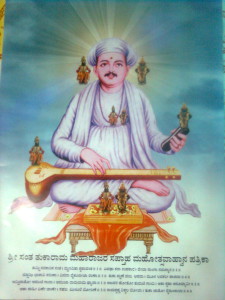Tukaram’s Meditation Practice
Tukaram, known as Tukoba, had a regular practice of climbing Bhandara Hill to meditate. Once he ascended the hill, he would often remain there for extended periods, lost in deep meditation.
Jijabai’s Devotion
Tukaram’s wife, Jijabai, had a routine of offering food to her husband before having her own meal. Every day, she would prepare his meal, place it in a basket, and climb the hill to feed him. Only after ensuring he had eaten would she have her lunch.
The Incident on Bhandara Hill
One day, while climbing Bhandara Hill to bring Tukaram his food, Jijabai became tired. As she walked, a large thorn pricked her foot, causing her to fall and cry out in pain. Overwhelmed, she began to weep.
Panduranga’s Compassion
Moved by Jijabai’s devotion and distress, Lord Panduranga appeared in his Sagun form as a shepherd. He gently removed the thorn from her foot and helped her to stand up. After ensuring she was alright, he left without revealing his divine identity.
Tukaram’s Realization
When Jijabai reached Tukaram and narrated the event, Tukaram instantly realized that it was none other than Lord Panduranga who had come to her aid. Deeply touched by the Lord’s compassion and concerned about causing him trouble, Tukaram decided to change his practice.
Tukaram’s New Resolution
From that day forward, Tukaram resolved to come home for lunch to avoid troubling Panduranga. He did this out of deep respect and love for the Lord, recognizing the divine intervention and care bestowed upon his family.
Reflection on the Story
Devotion and Divine Care:
- Jijabai’s unwavering devotion to her husband and her practice of ensuring his well-being exemplify the power of sincere devotion. The divine response to her distress highlights how true devotion attracts divine care and intervention.
Compassion and Humility:
- Tukaram’s decision to change his routine to prevent troubling the Lord shows his humility and deep respect for the divine. It reflects the interconnectedness of human devotion and divine compassion.
Simplicity and Spiritual Practice:
- The story emphasizes that spiritual practices, while important, should be balanced with practical considerations and compassion for others. Tukaram’s adjustment of his routine underscores the importance of considering the well-being of loved ones and the divine.
Lessons to Be Learned
- Power of Devotion:
- Sincere devotion and love, as demonstrated by Jijabai, can invoke divine compassion and care, leading to miraculous interventions.
- Divine Compassion:
- The story illustrates how the divine is attentive to the needs and pains of devotees, responding with compassion and support.
- Humility in Spirituality:
- Tukaram’s humility in changing his routine to prevent troubling the Lord teaches the importance of humility and sensitivity in spiritual practice.
- Balance in Devotion:
- While pursuing spiritual goals, it is essential to maintain a balance and consider the well-being of oneself and others, reflecting true compassion and practical wisdom.
In summary, the story of Tukaram, Jijabai, and Lord Panduranga on Bhandara Hill teaches us about the power of sincere devotion, the compassionate response of the divine, and the importance of humility and balance in spiritual practices. Tukaram’s life and actions serve as a profound example of how devotion, humility, and practical wisdom are interwoven on the path to spiritual realization.
4o



